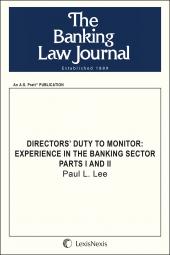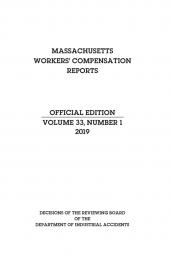Directors’ Duty to Monitor: Experience in the Banking Sector
Select a format
 International Order Inquiry
International Order Inquiry
Select subscription type
Terms & conditions
Subscribers receive the product(s) listed on the Order Form and any Updates made available during the annual subscription period. Shipping and handling fees are not included in the annual price.
Subscribers are advised of the number of Updates that were made to the particular publication the prior year. The number of Updates may vary due to developments in the law and other publishing issues, but subscribers may use this as a rough estimate of future shipments. Subscribers may call Customer Support at 800-833-9844 for additional information.
Subscribers may cancel this subscription by: calling Customer Support at 800-833-9844; emailing customer.support@lexisnexis.com; or returning the invoice marked "CANCEL".
If subscribers cancel within 30 days after the product is ordered or received and return the product at their expense, then they will receive a full credit of the price for the annual subscription.
If subscribers cancel between 31 and 60 days after the invoice date and return the product at their expense, then they will receive a 5/6th credit of the price for the annual subscription. No credit will be given for cancellations more than 60 days after the invoice date. To receive any credit, subscriber must return all product(s) shipped during the year at their expense within the applicable cancellation period listed above.
The total price includes the product(s) listed in the Order Form and any Updates for a limited period (minimum period of 30 days) after the order is placed ("Order Window"). Shipping and handling fees are not included in the grand total price.
All shipments may be returned, at subscribers' expense, for full credit of the Price within 30 days of receipt.
Shipments may not be returned, and no credits will be issued, more than 30 days after receipt.
After the Order Window, subscribers will receive notice of Updates along with the then-current grand total price and order process as Updates become available. Subscribers will only be shipped those Updates they specifically request.
Product description
Part I of Directors’ Duty to Monitor: Experience in the Banking Sector discusses the development of the directors’ duty to monitor by the Delaware courts. It then discusses the view of certain commentators that Delaware law provides for a “lax liability” regime (in some cases arguably a “no liability” regime) for board oversight responsibility. To evaluate the actual standards applicable to the directors of bank holding companies, Part I provides a detailed discussion of derivative actions mounted against bank holding companies both before and after the financial crisis. This discussion focuses on the distinction (as well as the possible interplay) between the corporate law standards for board oversight and the regulatory standards for board oversight. Part I also discusses the force of norms under Delaware law and the influence of best practice standards adopted by industry groups, including financial industry groups. Many commentators have argued that Delaware law is influential in establishing norms for director behavior even though the case law rarely finds directors liable for a failure to monitor. These commentators also argue that best practice standards adopted by industry groups have had a significant influence on directors and have resulted in more robust oversight by directors.
Part II of the eBook discusses the regulatory and supervisory approaches that have been adopted by the bank regulatory authorities to board oversight at the level of both the bank and the bank holding company. There are manifold elements in these regulatory and supervisory approaches. Federal banking statutes expressly dictate certain board oversight requirements for banks and bank holding companies and provide the federal banking authorities with administrative enforcement powers, such as the power to impose civil money penalties on officers and directors of banks and bank holding companies. The FDIC also regularly pursues litigation against officers and directors of failed banks to recover damages for the receivership estate of failed banks, generally based on claims of gross negligence. These various ex post mechanisms exert a significant in terrorem effect on directors.
Table of contents
Directors’ Duty to Monitor: Experience in the Banking Sector--Part I (September 2016)
Directors’ Duty to Monitor: Experience in the Banking Sector--Part II (October 2016)
 Lexis Nexis
Lexis Nexis 


